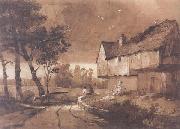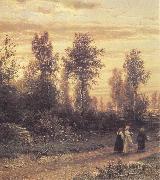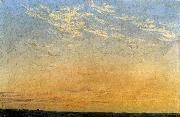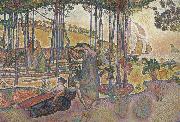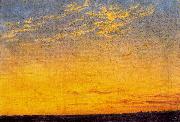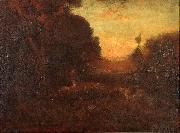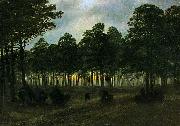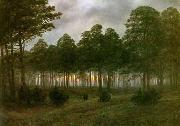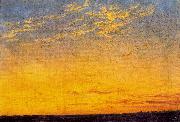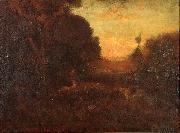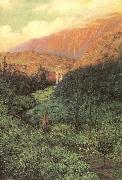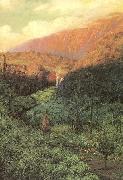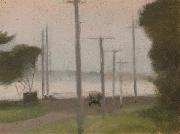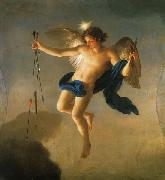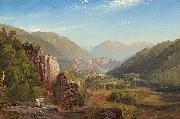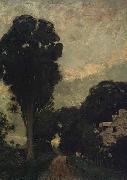Wholesale Oil Painting No Minimum |
|||||||||||
|
|
|||||||||||

|
|||||||||||
|
|
|
||||||||
Samuel Palmer1805-1881 British Samuel Palmer Galleries English painter, draughtsman and etcher. Palmer was a key figure of English Romantic painting who represented, at least in his early work, its pastoral, intuitive and nostalgic aspects at their most intense. He is widely described as a visionary and linked with his friend and mentor William Blake, though he stood at an almost opposite extreme in his commitment to landscape and his innocent approach to its imagery. He had none of Blake irony or complexity and was inspired by a passionate love of nature that found its philosophical dimension in unquestioning Neo-Platonism. |
||||||||
|
|
||||||||
Evening
Evening Painting ID:: 26368 |
mk49
1821
Brown ink and brown wash
mk49 1821 Brown ink and brown wash |
|||||||
|
|
||||||||
Ivan ShishkinRussian Painter, 1832-1898 was a Russian landscape painter closely associated with the Peredvizhniki movement. Shishkin was born in the town of Elabuga of Vyatka Governorate (today Republic of Tatarstan), and graduated from the Kazan gymnasium. He then studied at the Moscow School of Painting, Sculpture and Architecture for 4 years, then attended the Saint Petersburg Imperial Academy of Arts from 1856 to 1860, graduating with the highest honors and a gold medal. He received the Imperial scholarship for his further studies in Europe. Five years later Shishkin became a member of the Imperial Academy in St. Petersburg and was professor of painting from 1873 to 1898. At the same time, Shishkin headed the landscape painting class at the Higher Art School in St. Petersburg. For some time, Shishkin lived and worked in Switzerland and Germany on scholarship from the St. Petersburg Imperial Academy of Arts. On his return to Saint Petersburg, he became a member of the Circle of the Itinerants and of the Society of Russian Watercolorists. He also took part in exhibitions at the Academy of Arts, |
||||||||
|
|
||||||||
|
|
Evening
Evening Painting ID:: 35090 |
mk100
1871
Oil on canvas
71x44cm
mk100 1871 Oil on canvas 71x44cm |
||||||
|
|
||||||||
Caspar David Friedrich1774-1840 Caspar David Friedrich Locations German painter, studied art at Copenhagen, and in 1798 settled in Dresden. Friedrich painted chiefly landscapes and seascapes, with and without figures, architectural pictures, including a few of Dresden, and some religious subjects. Religious feeling and symbolism permeate his œuvre, of which the seascape with figures, Die Lebensstufen, is a characteristic example. He possessed considerable power to convey mood in landscape. Almost forgotten in the 19th c. and early 20th c., interest in his work increased considerably in the mid-20th c. He is hardly represented in Britain, but an exhibition of 112 of his pictures at the Tate Gallery in 1972 attracted much attention. F. G. Kersting was a friend of Friedrich. |
||||||||
|
|
||||||||
|
|
Evening
Evening Painting ID:: 44173 |
c. 1824
Oil on cardboard,
20 x 27,5 cm c. 1824 Oil on cardboard, 20 x 27,5 cm |
||||||
|
|
||||||||
Henri Edmond Cross1856-1910 French Henri Edmond Cross Locations French painter and printmaker. The only surviving child of Alcide Delacroix, a French adventurer and failed businessman, and the British-born Fanny Woollett, he was encouraged as a youth to develop his artistic talent by his father cousin, Dr Auguste Soins. He enrolled in 1878 at the Ecoles Academiques de Dessin et d Architecture in Lille, where he remained for three years under the guidance of Alphonse Colas (1818-87). He then moved to Paris and studied with Emile Dupont-Zipcy (1822-65), also from Douai, whom he listed as his teacher when exhibiting at Salons of the early 1880s. His few extant works from this period are Realist portraits and still-lifes, painted with a heavy touch and sombre palette (example in Douai, Mus. Mun.). |
||||||||
|
|
||||||||
|
|
evening
evening Painting ID:: 71180 |
mk290 air 1893-94 oil on canvas 45x65 in musee d orsay paris mk290 air 1893-94 oil on canvas 45x65 in musee d orsay paris |
||||||
|
|
||||||||
Caspar David Friedrich1774-1840 Caspar David Friedrich Locations German painter, studied art at Copenhagen, and in 1798 settled in Dresden. Friedrich painted chiefly landscapes and seascapes, with and without figures, architectural pictures, including a few of Dresden, and some religious subjects. Religious feeling and symbolism permeate his œuvre, of which the seascape with figures, Die Lebensstufen, is a characteristic example. He possessed considerable power to convey mood in landscape. Almost forgotten in the 19th c. and early 20th c., interest in his work increased considerably in the mid-20th c. He is hardly represented in Britain, but an exhibition of 112 of his pictures at the Tate Gallery in 1972 attracted much attention. F. G. Kersting was a friend of Friedrich. |
||||||||
|
|
||||||||
|
|
Evening
Evening Painting ID:: 73873 |
Evening
1824
cjr Evening 1824 cjr |
||||||
|
|
||||||||
William Keith(Nov 18, 1838 - April 13, 1911) was a Scottish-American painter famous for his California landscapes. Keith was born in Oldmeldrum, Aberdeenshire, Scotland, and emigrated to the United States in 1850. He lived in New York City, and became an apprentice wood engraver in 1856. He first traveled to the American West in 1858, after being assigned to do illustrations for Harper's Magazine. He moved to England briefly, working for the London Daily News. |
||||||||
|
|
||||||||
|
|
Evening
Evening Painting ID:: 74267 |
Prior to 1911
Oil on canvas
75.9 X 101.3 cm (29.88 X 39.88 in)
cjr Prior to 1911 Oil on canvas 75.9 X 101.3 cm (29.88 X 39.88 in) cjr |
||||||
|
|
||||||||
Caspar David Friedrich1774-1840 Caspar David Friedrich Locations German painter, studied art at Copenhagen, and in 1798 settled in Dresden. Friedrich painted chiefly landscapes and seascapes, with and without figures, architectural pictures, including a few of Dresden, and some religious subjects. Religious feeling and symbolism permeate his œuvre, of which the seascape with figures, Die Lebensstufen, is a characteristic example. He possessed considerable power to convey mood in landscape. Almost forgotten in the 19th c. and early 20th c., interest in his work increased considerably in the mid-20th c. He is hardly represented in Britain, but an exhibition of 112 of his pictures at the Tate Gallery in 1972 attracted much attention. F. G. Kersting was a friend of Friedrich. |
||||||||
|
|
||||||||
|
|
evening
evening Painting ID:: 74325 |
Date ca. 1820-1821
Medium Oil on canvas
Dimensions 22 X 30.5 cm (8.7 X 12 in)
cyf Date ca. 1820-1821 Medium Oil on canvas Dimensions 22 X 30.5 cm (8.7 X 12 in) cyf |
||||||
|
|
||||||||
Caspar David Friedrich1774-1840 Caspar David Friedrich Locations German painter, studied art at Copenhagen, and in 1798 settled in Dresden. Friedrich painted chiefly landscapes and seascapes, with and without figures, architectural pictures, including a few of Dresden, and some religious subjects. Religious feeling and symbolism permeate his œuvre, of which the seascape with figures, Die Lebensstufen, is a characteristic example. He possessed considerable power to convey mood in landscape. Almost forgotten in the 19th c. and early 20th c., interest in his work increased considerably in the mid-20th c. He is hardly represented in Britain, but an exhibition of 112 of his pictures at the Tate Gallery in 1972 attracted much attention. F. G. Kersting was a friend of Friedrich. |
||||||||
|
|
||||||||
|
|
evening
evening Painting ID:: 74328 |
Date ca. 1820-1821
Medium Oil on canvas
Dimensions 22 X 30.5 cm (8.7 X 12 in)
cyf Date ca. 1820-1821 Medium Oil on canvas Dimensions 22 X 30.5 cm (8.7 X 12 in) cyf |
||||||
|
|
||||||||
Caspar David Friedrich1774-1840 Caspar David Friedrich Locations German painter, studied art at Copenhagen, and in 1798 settled in Dresden. Friedrich painted chiefly landscapes and seascapes, with and without figures, architectural pictures, including a few of Dresden, and some religious subjects. Religious feeling and symbolism permeate his œuvre, of which the seascape with figures, Die Lebensstufen, is a characteristic example. He possessed considerable power to convey mood in landscape. Almost forgotten in the 19th c. and early 20th c., interest in his work increased considerably in the mid-20th c. He is hardly represented in Britain, but an exhibition of 112 of his pictures at the Tate Gallery in 1972 attracted much attention. F. G. Kersting was a friend of Friedrich. |
||||||||
|
|
||||||||
|
|
Evening
Evening Painting ID:: 75435 |
Evening by Caspar David Friedrich.jpg
English: Evening
Polski: Wieczer
Date 1824
cyf Evening by Caspar David Friedrich.jpg English: Evening Polski: Wieczer Date 1824 cyf |
||||||
|
|
||||||||
William Keith(Nov 18, 1838 - April 13, 1911) was a Scottish-American painter famous for his California landscapes. Keith was born in Oldmeldrum, Aberdeenshire, Scotland, and emigrated to the United States in 1850. He lived in New York City, and became an apprentice wood engraver in 1856. He first traveled to the American West in 1858, after being assigned to do illustrations for Harper's Magazine. He moved to England briefly, working for the London Daily News. |
||||||||
|
|
||||||||
|
|
Evening
Evening Painting ID:: 75674 |
Medium Oil on canvas
Dimensions 75.9 ?? 101.3 cm (29.9 ?? 39.9 in)
cyf Medium Oil on canvas Dimensions 75.9 ?? 101.3 cm (29.9 ?? 39.9 in) cyf |
||||||
|
|
||||||||
Lionel Walden(1861-1933) was born in Norwich, Connecticut in 1861. He first became interested in art in Minnesota, where the family moved when his father became rector of an Episcopal Church there. As a young man, Walden moved to Paris where he studied painting with Carolus-Duran. In around 1893-97, Walden was in England, living in Falmouth. Paintings of Cardiff in Wales are in museums in Cardiff and Paris. Walden received medals from the Paris Salon and was made a Knight of the French Legion of Honor. He visited to Hawaii in 1911 and several times thereafter. Walden died in Chantilly, France in 1933. According to David H. Forbes, author of Encounters with Paradise: Views of Hawaii and its People, 1778-1941, Lionel Walden "was the finest seascape painter to work in Hawaii". The Brooklyn Museum, the Henry Art Gallery (University of Washington, Seattle), the Honolulu Academy of Arts, the Isaacs Art Center (Waimea, Hawaii), and the Musee d'Orsay are among the public collections holding works by Lionel Walden. |
||||||||
|
|
||||||||
|
|
Evening
Evening Painting ID:: 79189 |
oil on canvas painting by Lionel Walden, c. 1916
cyf oil on canvas painting by Lionel Walden, c. 1916 cyf |
||||||
|
|
||||||||
Lionel Walden(1861-1933) was born in Norwich, Connecticut in 1861. He first became interested in art in Minnesota, where the family moved when his father became rector of an Episcopal Church there. As a young man, Walden moved to Paris where he studied painting with Carolus-Duran. In around 1893-97, Walden was in England, living in Falmouth. Paintings of Cardiff in Wales are in museums in Cardiff and Paris. Walden received medals from the Paris Salon and was made a Knight of the French Legion of Honor. He visited to Hawaii in 1911 and several times thereafter. Walden died in Chantilly, France in 1933. According to David H. Forbes, author of Encounters with Paradise: Views of Hawaii and its People, 1778-1941, Lionel Walden "was the finest seascape painter to work in Hawaii". The Brooklyn Museum, the Henry Art Gallery (University of Washington, Seattle), the Honolulu Academy of Arts, the Isaacs Art Center (Waimea, Hawaii), and the Musee d'Orsay are among the public collections holding works by Lionel Walden. |
||||||||
|
|
||||||||
|
|
Evening
Evening Painting ID:: 79945 |
oil on canvas painting by Lionel Walden, c. 1916
cyf oil on canvas painting by Lionel Walden, c. 1916 cyf |
||||||
|
|
||||||||
Clarice BeckettAustralian Painter, 1887-1935,Australian painter. She studied at the National Gallery School, Melbourne (1914-16), and with Max Meldrum became involved (c. 1917) with the Meldrum circle of artists, which included Colin Colahan (1897-1987), Justus Jorgensen (1893-1975), John Farmer (b 1897) and Percy Leason (1889-1959). In 1919 she moved to the seaside suburb of Beaumaris, where she lived and worked for the rest of her life. |
||||||||
|
|
||||||||
|
|
Evening
Evening Painting ID:: 82297 |
oil on board, 30.5 x 40.5 cm
cyf oil on board, 30.5 x 40.5 cm cyf |
||||||
|
|
||||||||
Anton Raphael Mengs1728-1779 Dutch Anton Raphael Mengs Gallery Mengs was born in 1728 at Usti nad Labem (German: Aussig) in Bohemia on 12 March 1728; he died in Rome 29 June 1779. His father, Ismael Mengs, a Danish painter, established himself finally at Dresden, whence in 1741 he took his son to Rome. In Rome, his fresco painting of Parnassus at Villa Albani gained him a reputation as a master painter. The appointment of Mengs in 1749 as first painter to Frederick Augustus, elector of Saxony did not prevent his spending much time in Rome, where he had married Margarita Quazzi who had sat for him as a model in 1748, and abjured the Protestant faith, and where he became in 1754 director of the Vatican school of painting, nor did this hinder him on two occasions from obeying the call of Charles III of Spain to Madrid. There Mengs produced some of his best work, and specially the ceiling of the banqueting-hall of the Royal Palace of Madrid, the subject of which was the Triumph of Trajan and the Temple of Glory. Among his pupils there was Agust??n Esteve. After the completion of this work in 1777, Mengs returned to Rome, and there he died, two years later, in poor circumstances, leaving twenty children, seven of whom were pensioned by the king of Spain. His portraits and autoportraits recall an attention to detail and insight, often lost from the grand manner paintings. Besides numerous paintings in the Madrid gallery, the Ascension and St Joseph at Dresden, Perseus and Andromeda at Saint Petersburg, and the ceiling of the Villa Albani must be mentioned among his chief works. In 1911, Henry George Percy, 7th Duke of Northumberland, possessed a Holy Family, and the colleges of All Souls and Magdalen, at Oxford, possessed altar-pieces by Mengs's hand. In his writings, in Spanish, Italian and German, Mengs has put forth his eclectic theory of art, which treats of perfection as attainable by a well-schemed combination of diverse excellences Greek design, with the expression of Raphael, the chiaroscuro of Correggio, and the colour of Titian. He would have fancied himself the first neoclassicist, while in fact he may be the last flicker of Baroque art. Or in the words of Wittkower, In the last analysis, he is as much an end as a beginning. His intimacy with Johann Joachim Winckelmann, who constantly wrote at his dictation, has enhanced his historical importance, for he formed no scholars, and the critic must now concur in Goethe's judgment of Mengs in Winckelmann und sein Jahrhundert; he must deplore that so much learning should have been allied to a total want of initiative and poverty of invention, and embodied with a strained and artificial mannerism. Mengs was famous for his rivalry with the contemporary Italian painter Pompeo Batoni. |
||||||||
|
|
||||||||
|
|
Evening
Evening Painting ID:: 84084 |
Date ca. 1765
cyf Date ca. 1765 cyf |
||||||
|
|
||||||||
Thomas Moranb1837 UK d1926 Thomas Moran Locations Thomas Moran (February 12, 1837 - August 25, 1926) from Bolton, England was an artist of the Hudson River School who often painted the Rocky Mountains. Thomas Moran's vision of the Western landscape was critical to the creation of Yellowstone National Park. Thomas Moran along with Albert Bierstadt, Thomas Hill, and William Keith are sometimes referred to as belonging to the Rocky Mountain School of landscape painters because of all of the Western landscapes made by this group. |
||||||||
|
|
||||||||
|
|
Evening
Evening Painting ID:: 84717 |
1864(1864)
Medium Oil on canvas
cyf 1864(1864) Medium Oil on canvas cyf |
||||||
|
|
||||||||
William Smith Jewett1789-1874 William Smith Jewett Galleries |
||||||||
|
|
||||||||
|
|
Evening
Evening Painting ID:: 98141 |
1907(1907)
Medium oil on canvas
Dimensions 100.5 x 72.4 cm
cyf 1907(1907) Medium oil on canvas Dimensions 100.5 x 72.4 cm cyf |
||||||
|
|
||||||||
|
William Smith Jewett 1789-1874 William Smith Jewett Galleries Evening 1907(1907) Medium oil on canvas Dimensions 100.5 x 72.4 cm cyf |
||||||||
|
|
||||||||
|
Prev Next
|
||||||||
|
|
||||||||
|
Related Paintings to William Smith Jewett :. |
||||||||
|
|
||||||||
|
CONTACT US |
